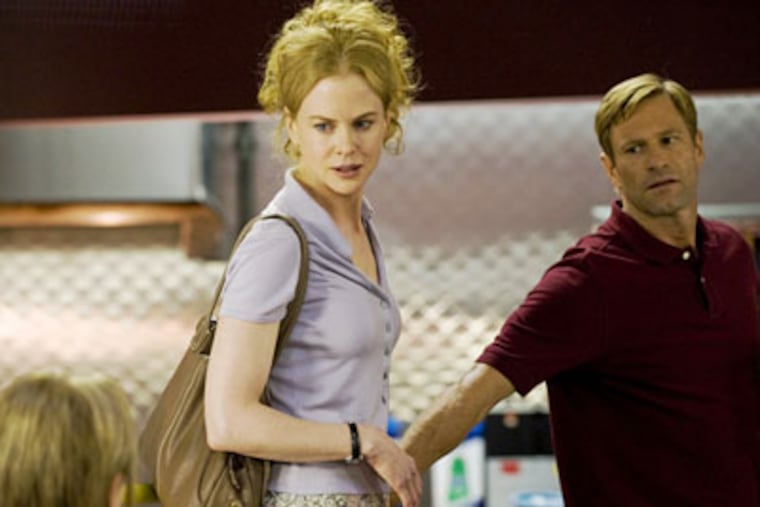
I WAS TORN in "Rabbit Hole" between sympathy for a couple who's lost a child, and envy of their fantastic house.
Grief is everywhere in the movie, but so are Viking ranges and leaded glass windows, ornate moldings and other fittings appropriate to a fantastic period renovation/updating of their century-old home.
As you've probably heard, though, this is not a movie about real estate (although the carved-wood front door does open to fantastic views of the Hudson).
Gawking gives way to a consideration of grief. As the movie opens, Becca (Nicole Kidman) and Howie (Aaron Eckhart) are only a few months removed from the random accident that claimed the life of their little boy.
There is no recovering from such a thing, of course, and the faultlines left by unresolved feelings are everywhere, magnified by the couple's differing, conflicting approaches to grief.
Howie wants the physical comfort of holding his wife, he wants to talk during group therapy, he wants to indulge his memories of the boy, he likes to stare at home movies at night on his iTouch.
Becca does not want to be touched, she can hardly contain her disdain for the sharing-minded couples in group, she wants her memories walled off. She strips the refrigerator of his drawings, donates his clothes to charity.
It's brave of Kidman to wade into this frosty character without the crutch of making her conventionally "likable." I don't know of another actress who could do it as well - she's always been good suggesting a woman a little too tightly wrapped.
Director John Cameron Mitchell, in turn, wraps his movie around her, and allows it to become dominated by her character's subzero personality.
This is unusual, if not always judicious. There's a scene of Becca berating a religious couple at group therapy, and this is more than the fury of a woman who cannot be consoled; it's typical of the kind of antireligious spasm common to high-toned fare.
Still, it's interesting to see a movie approach the subject of grief without the payoff of catharsis, healing, the palliative of closure.
"Rabbit Hole" is cool to the touch - a work of unusual subtlety by the actors, and with few of the Oscar-audition outbursts that occur in movies on this subject.
And when tempers do flare, they're more about revelation than emotion. Kidman has a great scene with Dianne Wiest, who, as her mother, makes the mistake of comparing her own son's death by overdose to Becca's loss.
"Rabbit Hole" also contrasts the now childless Becca, a hyper-educated former supermom, with her suddenly pregnant (and very irresponsible) younger sister, one of the few places where the movie feels schematic.
The movie's most curious twist, though, is Becca's developing relationship with a neighborhood teenager - no, not that kind of relationship (Kidman's past role in "To Die For" looms large here).
It goes in a platonic, philosophical direction, and Becca finds a cold comfort here that has eluded her in therapy, at home, within her family.
"Rabbit Hole" is, at least, appropriate to winter - it's about the icy withdrawal imposed by loss, without the thaw.